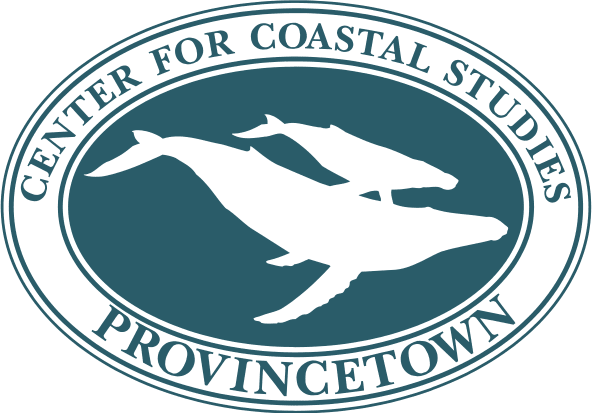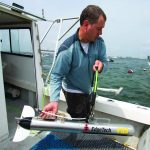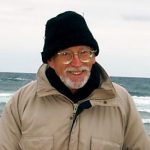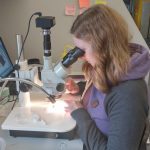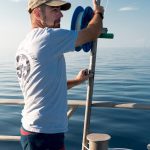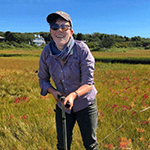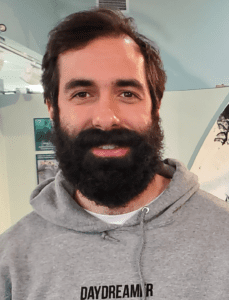Marine Geology – Meet The Team
Mark Borrelli, PhD
Department Chair, Director, Seafloor Mapping Program
Mark Borrelli is a coastal geologist. He received a B.S. from Tufts University, an M.S. from the University of North Carolina at Chapel Hill and a Ph.D. from the University of Rhode Island. His research interests include coastal sedimentary processes in general and understanding how storms, sea level rise and anthropogenic impacts affect the coast in particular. Recent and ongoing research include mapping the seafloor in shallow (<1 – 10 m) coastal waters, studying bedforms and sediment transport in the nearshore, understanding the morphodynamics of tidal inlets as well as coastal evolution on multiple temporal and spatial scales. Mark is also the director of the Coastal Processes and Ecosystems Laboratory (CaPE Lab), a joint research effort between CCS and the School for the Environment within the University of Massachusetts Boston.
Graham Giese, PhD
Scientist Emeritus; Land-Sea Interaction Program
Graham Giese is one of the three founders of the Center for Coastal Studies and has served, in its early days, as the Center’s director and president. Graham holds a M.S. degree in Oceanography from the University of Rhode Island and a Ph.D. in Geophysical Sciences from the University of Chicago. He has over 50 years experience in the fields of coastal geology and coastal oceanography, and has authored or co-authored some 30 peer-reviewed papers and books, and some 60 unrefereed papers and technical reports dealing with physical coastal processes. Graham is a member of the American Geophysical Union, Geological Society of America and the Coasts Oceans Ports and Rivers Institute, American Society of Civil Engineering. He is also adjunct faculty at the University of Massachusetts at Boston and Oceanographer Emeritus at the Woods Hole Oceanographic Institution.
Agnes Mittermayr, PhD
Marine Ecologist
Agnes Mittermayr is a marine ecologist interested in benthic invertebrate community structures and habitats. Her research focuses on how physical, chemical, and biological processes and interactions shape the available benthic habitat and species composition of coastal waters. Recent and ongoing projects include benthic habitat mapping, restoration efforts of salt marsh and eelgrass habitats, stable isotope studies of food web interactions and trophic niches, and tracing and quantifying the effects of anthropogenic activities on coastal community structure. Agnes has a PhD in Biological Oceanography from GEOMAR – Helmholtz Center for Ocean Research (Kiel, Germany) and a MS in Oceanography from the University of Southampton (UK).
Bryan Legare
Doctoral Intern
Bryan Legare is a seascape ecologist interested in understanding marine ecosystems and the movements of organisms within them. Bryan specializes in the use of marine technologies to quantify both the biotic and abiotic characteristics of the marine environment. These technologies include sonar (sidescan, multibeam, singlebeam, and imaging), current profilers, acoustic telemetry, and in-situ data loggers. He links these data in GIS software using spatial and non-parametric statistics to understand long-term trends in relation to natural and anthropogenic ecosystem processes. Recent and ongoing research includes quantifying the long and short term effects of hydraulic clamming, long-term tidal monitoring within Cape Cod estuaries, and the relationship between white shark movement patterns and nearshore white shark habitat. Legare has an MS in marine and environmental science from the University of the Virgin Islands and a BS in biology from the University of New Hampshire.
Steve Mague
Program Director, Coastal Geographic Research and Applied Sciences
Prior to joining CCS full time, Steve worked as a center Coastal Geographer Adjunct Scientist on projects that included developing of a methodology to map storm tide pathways and the use of historical data to quantify century-scale sediment transport in Cape Cod Bay. For 12 years Steve was a partner at Durand & Anastas Environmental Strategies, Inc,. focusing on the application of coastal and offshore mapping solutions to emerging development and environmental challenges in the coastal zone. Prior to that he spent over 10 years with the Massachusetts Office of Coastal Zone Management (CZM) and as a senior project manager with Schofield Brothers of New England, Inc. Steve has an Master’s degree in Environmental Science from UMASS Boston.
Samantha Jo McFarland
Assistant Program Director , Coastal Geographic Research and Applied Sciences
Samantha McFarland is a research associate and a licensed UAV pilot. Her research focuses on UAV based surveying of beach and back barrier environments for multispectral and 3D spatial analysis using GIS and structure from motion. She plans to produce and compare fine scale 3D surface models of coastal areas around Cape Cod to quantify specific storm impacts and to look at episodic and seasonal morphological variability. Sam has an MS in Marine Science and Technology from UMASS Boston.
Dan Solazzo
Marine Researcher
Dan Solazzo is a remote sensing specialist, and a licensed small unmanned aerial system (sUAS) pilot. He uses UAS imagery to make accurate, high resolution digital elevation models to map change in coastal systems and creates vegetation maps using a multispectral sensor carried by one of the unmanned aerial vehicles. Dan has an MS in Environmental Sciences and Policy from Northern Arizona University. He worked with the USGS Grand Canyon Monitoring and Research Center to complete a terrestrial LiDAR survey of dune fields in the Grand Canyon, and participated in UAS studies of invasive species, snowpack monitoring, forest structure, biological soil crusts, and sand erosion and deposition as part of the Remote Sensing & Geoinformatics Lab at NAU.
Katherine Castagno, PhD
Program Director, Land – Sea Interaction
Dr. Katie Castagno is a coastal geologist whose research interests focus on the intersections among coastal resilience, salt marsh restoration, and sediment transport. Recent research revolves around coastal geomorphic changes on Cape Cod, including monitoring the sediment dynamics of the Herring River and Wellfleet Harbor to document pre-restoration baseline conditions and support meaningful projections of future conditions with the Herring River Restoration Project, the largest tidal restoration project in New England. Katie has a PhD in Geological Oceanography from the Massachusetts Institute of Technology-Woods Hole Oceanographic Institution Joint Program in Oceanography and a MA in Marine Affairs from the University of Rhode Island.
Pedro dos Santos
Assistant Program Director, Seafloor Mapping Program
Pedro dos Santos is an oceanographer interested in coastal processes and physical-biological interactions. He is responsible for fieldwork planning, data acquisition and processing at the CCS and the Coastal Processes and Ecosystems Laboratory (CaPE Lab). He is specialized in seafloor mapping, hydrography, geoprocessing, and time series analysis. Pedro has a MSc in Biological Oceanography and BSc in Oceanography from the Oceanographic Institute at the University of São Paulo. He studied the influence of the wind field and Brazil Current meandering on the input of nutrients and phytoplankton growth in the inner shelf under the long term ChloroGIN/Antares project.
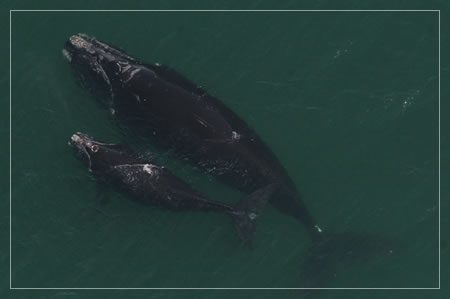
Our Work
Humpback Whale Research
Right Whale Research
Marine Animal Entanglement Response
Marine Geology Department
Water Quality Monitoring Program
Marine Fisheries Research
Seal Research
Shark Research
Marine Education
Interdisciplinary
Marine Debris and Plastics Program
Marine Policy Initiative
Cape Cod Climate Change Collaborative
Publications
